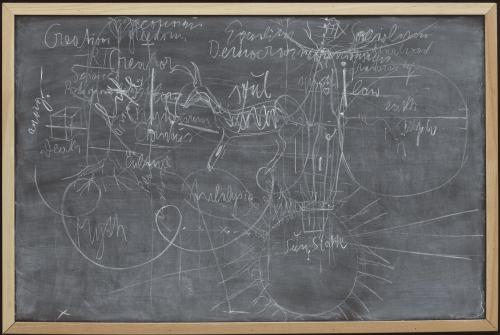I Wrote About The Empowering Educational Theories Within Ej Hill's Artwork On My Blog, Artfully Learning.
I wrote about the empowering educational theories within Ej Hill's artwork on my blog, Artfully Learning. Read the post: https://theartsandeducation.wordpress.com/2021/06/09/artfully-assessing-an-american-education/

“#Lesson #3” by EJ Hill @iheartbeuys Photo by @juliafeatherphoto More info at: https://barbarapicci.com/2022/06/03/lesson-3-by-ej-hill/
#tenderness #artinstallation #installazione #installation #installationview #exhibitionview #cultureisfreedom #artisfreedom #curiositykilledtheblogger #artblogging #photooftheday #artaddict #artistsoninstagram #amazing #artwork #instacool #instaart #followart #artlover #contemporaryart #artecontemporanea #artmuseum #artcurator #artwatchers #artcollectors #artdealer #arthistory
https://www.instagram.com/p/CeYAooho2mO/?igshid=NGJjMDIxMWI=
More Posts from Artfullearner and Others

Susan Leopold, Classroom, 2022, mixed media construction, digital print mounted on Plexiglas, electrical lighting, LED light bulb and wood, 18 x 12 x 10 inches. Courtesy of the artist and Elizabeth Harris Gallery.
Susan Leopold's series "School(s)" expresses the cultural and pedagogical zeitgeist of the past several years. You can read about her intimate sculptures of school interiors and their connection to the many facets of the educational environment in the Artfully Learning post "School(s)" ; and also listen to a conversation between Susan and I on the Artfully Learning Audio Series Episode 1: School(s).

Hugh Hayden, Brier Patch, 2022. Installed at Madison Square Park in New York City. Photograph by Yasunori Matsui, courtesy of Madison Square Park Conservancy.
Read about Hugh Hayden's thorny and artful critique of inequity within the public education system in NYC (and by extension, the U.S.A at large) in the post "Into the weeds of public education" on Artfully Learning: https://theartsandeducation.wordpress.com/2022/05/07/into-the-weeds-of-public-education/

“Art is literacy of the heart.” -Elliot Eisner

As an artist, educator and art historian my concerns are about symbolically visualizing and accurately documenting experiences that prompt us to consider taking steps towards bettering ourselves and our surroundings. Although art is often symbolic and abstract in its function, it can certainly (and already has) led to transformative changes that benefit humanity and ecology alike. The laborious, creative process itself is an act of perpetuation, which is a main tenet of maintenance. Prior to a work of art entering society, the artist develops an idea behind their work and must nurture that concept by fashioning it into a tangible object or experience. Once the artwork leaves their studio it takes on a new purpose. Whether it is intended for public reflection or the white walls of a gallery, the artwork also requires significant care.
Inspired by renowned social reformer Jane Addams' 1907 essay, “Utilization of Women in City Government,” I wrote a piece about the role that art can have in societal and environmental upkeep. You can read it on Artfully Learning: https://theartsandeducation.wordpress.com/2022/11/06/utilization-of-artists-in-societal-and-environmental-maintenance/
![Ruth Asawa Teaching Paper Folding, Ca. 1980s [© Estate Of Ruth Asawa]](https://64.media.tumblr.com/c6697e63db07e75713b9443a406a9541/2bbbef9b26c5b1e4-6d/s500x750/168a1e1b79e95e732420c4cb6bd78cd67fab00ba.png)
Ruth Asawa teaching paper folding, ca. 1980s [© Estate of Ruth Asawa]

Top: 2- Stage Transfer Drawing. ( Advancing to a Future State), Boise, Idaho. Erik to Dennis Oppenheim, 1971. Bottom: 2- Stage Transfer Drawing. ( Returning to a Past State), Boise, Idaho Dennis to Erik Oppenheim, 1971. Source: The Estate of Dennis Oppenheim
How does drawing extend beyond actual marks made on a surface? Find out in my post "Lineage Drawing," where I describe the impact of a 1970s collaboration between conceptual artist Dennis Oppenheim and his children. Read it via the URL here: https://theartsandeducation.wordpress.com/2023/01/02/lineage-drawing/

Jiro Yoshihara, Please Draw Freely, 1956. Paint and marker on wood. Installation view during the Outdoor Gutai Art Exhibition in Ashiya Park, Ashiya, 27 July – 4 August, 1956.
Yoshihara was a leading member of the Japanese avant-garde Gutai Group of visual artists, known for their physical and oft-confrontational artworks. A lesser discussed aspect of their legacy is their contributions to art education, which truly highlight the potency and potential of communal creativity. I wrote about the latter aspect on Artfully Learning in a post called "The Gutai Group: Play, Pedagogy and Possibility." Read it here: https://theartsandeducation.wordpress.com/2022/08/03/the-gutai-group-play-pedagogy-and-possibility/

Andy Warhol, Claes Oldenburg, David Novros, ForrestMyers, Robert Rauschenberg and John Chamberlain, Moon Museum, 1969, lithograph of tantalum nitride film on ceramic wafer. Source: MoMA
Whether or not you believed they put an art museum on the moon, my latest Artfully Learning post highlights art's universal value. Read about how the Space Race impacted art education and led to STEAM learning in "Art Spaces: Interdisciplinary and Interplanetary Explorations Through Artful Learning"

Hamish Fulton, Seven Paces, 2003, cast iron installation. Photograph by Hans Weingartz, CC BY-SA 2.0 DE https://creativecommons.org/licenses/by-sa/2.0/de/deed.en, via Wikimedia Commons
I wrote about how we can walk with a purpose by expressing habits of mind that we learn through art. Read "How to walk like an Artist" on my blog, Artfully Learning: https://theartsandeducation.wordpress.com/2023/01/19/how-to-walk-like-an-artist/
-
 artfullearner reblogged this · 2 years ago
artfullearner reblogged this · 2 years ago -
 artfullearner liked this · 2 years ago
artfullearner liked this · 2 years ago -
 barbarapicci reblogged this · 2 years ago
barbarapicci reblogged this · 2 years ago

Art + Education Blog: Artfully Learning Podcast: Artfully Learning Audio Series
54 posts
